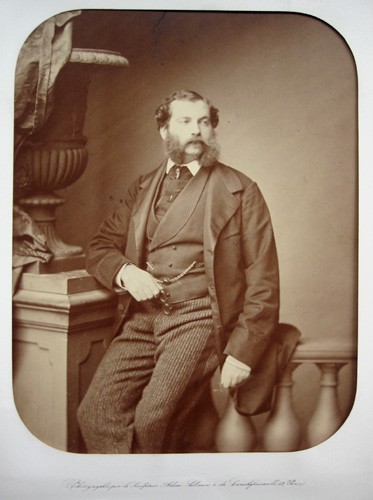Salomon de Rothschild Tours America (1861)
Carnivals and Railroads
N.Y., February 6, 1860
While high society is amusing itself, low society isn't losing time either. Yesterday there was a celebration at a wine merchant's. Several young men, wanting to celebrate this solemn occasion in their own way, went and got a cannon, which they loaded and fired twice, amid great applause from their comrades. The police watched them do this without budging, but since it was three o'clock in the morning, all the good citizens of the neighborhood, who had been awakened with a start, came down scantily clothes, thinking that some unknown enemy was taking over the city. This is one of numerous American jokes.
 Lent continues to case a veil of sadness over New York. Celebrations have completely ceased, and there are only several occasional dinners given. The ladies go to the theatre, the gentlemen to the boxing matches and fights with gloves. I saw one of these exhibitions, and what interested me most was the audience made up of representatives of all the dangerous classes of New York. This type of amusement is of much greater interest to Americans than the most important political debates.
Lent continues to case a veil of sadness over New York. Celebrations have completely ceased, and there are only several occasional dinners given. The ladies go to the theatre, the gentlemen to the boxing matches and fights with gloves. I saw one of these exhibitions, and what interested me most was the audience made up of representatives of all the dangerous classes of New York. This type of amusement is of much greater interest to Americans than the most important political debates.
New York, March 18, '60.
Yesterday we had a celebration in honor of Saint Patrick, the saint of the Irish, who really had their fill of it. The city was entirely theirs. From morning to night huge parades furrowed the main thoroughfares and stopped traffic. Never have I seen such a grotesque throng. The car conductors, thinking that they alone had the right to obstruct traffic, became angry. There were fights. There were broken heads. Horses were killed. In the evening the celebration was ended by setting fire to a house, which, of course, was insured.
The theatres, which the people of New York love passionately, aren't worth very much. Seldom have I seen such depraved taste. The weakest plays or stage farces worthy only of the St. Cloud fair are the ones that are applauded. This bad taste exists everywhere in the arts and in letters. You must see the creations of American painters! There is a French theatre, which went bankrupt three times this year. I have not as yet gotten up the courage to go there...
New York, March 30, '60.
...I took a rather short but interesting trip to Washington, going through Philadelphia and Baltimore. I can't say I admire the way Americans travel. Their railroads are in a deplorable state and don't seem to care what's going to happen. To go to Washington, you've got to change six times, take the steamboat (known as the ferry) three times, and herd an infinite number of times into a great cosmopolitan omnibus.
But here is the great joy in American railroads: there is only one class, in which everyone travels without distinction. You should see then what fine traveling companions you get. Go ahead, go among those you see, though they spit obnoxiously and though they indulge in all sorts of similarly offensive behavior! Yet, there are some who keep following you regardless of what you do, and finding themselves at ease in your company, get others and others to join them, ad infinitum. This happened to me, to the great horror of my faithful Pierre, who said to me in a frightened manner: "I've just found five bugs in your trunk." "Kill them," I answered him, with the stoicism of a Cato.
As far as the comfort of the cars is concerned, one shouldn't talk about that either. They are first-class cars, adapted for the use of sixty persons. When the people enter, they purchase the right of doing anything they please, except maybe the right to lean comfortably. For when you finally do fall asleep on your arm, you are always awakened with a start, roughly shaken by the powerful hand of the conductor, who asks you for one of your many tickets. Or you are brought back to reality by the loud voice of the boy who offers you newspapers and the latest publications.
Fortunately, we arrived in Washington only a few hours late. When the train was in Pennsylvania, the engine decided to imitate the local shoemakers: it boldly went on strike in the middle of a field and refused to budge, despite all the encouragement it received. Its location was quite unpleasant, since the railroad had only one track. Luckily, the approaching train had the courtesy to stop, which permitted ours to draw away, thanks to a relief engine.
Our arrival in Washington was highly amusing. As in all the cities of the Union, a legion of hackney drivers, worse than the cartaneros of Valencia, argue among themselves for the [privilege of conveying] the unfortunate travelers, whom they assume to be sufficiently rich to allow themselves to be transported in their berlins. they begin by fighting among themselves, but then they maul the traveler under the pretext of leading him to their vehicles. You're quite fortunate if you enter one of them without a scratch on your body or a rent in your clothes.
Codgers at War and Brothers in Arms
The convention at Baltimore is still in progress but so far has gotten nowhere, and animosity between the Northern and Southern delegates is on the increase. These gentlemen take advantage of intermissions at the sessions to take a poke at each other, which produces the most shameful scenes.
Here's an incident that took place, in passing: The Union Club is made up mostly of old codgers, among whom are two gentlemen whose ages total 150: Messrs. Niel and Boyant, very respectable otherwise and very rich. They had begun a political discussion on [the Italian leader, Guiseppe] Garibaldi. One of the men claimed he was an Italian; the other said he was of Scotch origin. After the most persuasive arguments, Mr. Boyant supported his logic with a terrific punch which, be a fatal coincidence, hit Mr. Niel on the nose. This nose, which is quite long, met the finger and got angry. Then its owner, undertaking its defense, fell upon his interlocutor with might and main, and the battle was begun with punches. When the two enraged septuagenarians had been separated, they went off, pistols in hand, to Norfolk to settle their quarrel. Mr. Niel received a bullet wound in his arm, which makes him very proud...
Jamestown [New York] July 4, '60.
I shall tell you some more about the Japanese. I must talk about them just once more, and I swear to you it will be the last time. Besides, those noble barbarians have, thank heaven, retaken the road to their penates, the Americans having told them that they [the Americans] are the greatest nation in the world and taking good care not to let them visit Europe, or even the "Great Eastern" [a British steamship, then the largest in the world].
Before their departure, the City of New York and [August] Belmont each gave a celebration in their honor. The city celebration took place in the Metropolitan Hotel, which had been connected for the occasion with a large theatre called the Niblo. That could have been very nice, but they only succeeded in bringing in a filthy crowd...We were part of a large group of society people to go to this celebration, to which 12,000 persons had been invited...
After being amused for a long time by the shapes and the costumes of the guests, and with a certain amount of difficulty making our way through a solid mass of 3,000 persons, as we waited impatiently for several hours for the supper hall to open, we went to pay our respects to the Asiatic princes, who had not been embellished by their sojourn in New York. they were sitting on a platform, offering competition to the menagerie of Van Ambergh. In order to complete the similarity, there was a man standing by with a large staff in his hand, who, to judge by his figure and his clothes, could have passed for an exhibitor of bears. At the top of his lungs he kept yelling: "Pass on, gentlemen, pass on!"
When we wanted to leave, we were all separated by the crowd, and I wound up with two women in my arms. The fair sex loses all its luck in a crowd. I confess I considered myself extremely fortunate when, after an hour, I found myself in the street.
Belmont's party, which took place the following day, was one of perfect elegance. The Japanese spent their time eating and were greatly delighted by a liqueur from their country called soki [sake] which Commodore Perry had brought back. This beverage is very much like Athenian water...
Here [in Jamestown] I have been able to study the American character in a form completely new to me. Corruption has as yet not penetrated here, nor that false civilization which I could not endure in New York. Democratic and even uncouth ways are carried to the extreme. You dine at the same table and eat the same food as the workingman. A man in tatters will extend his hand to you and will be offended if you don't take it. You've got to put away your aristocratic thoughts if you still have any left. But these are good people, refined by work, always ready to be of assistance, who have the realization of their strength and their independence. They are self-made men are proud of it. From childhood on they have only one thought: "Go ahead." The coachman who drove my carriage was certainly no more than nine years old, and a tiny chap five years old, seeing me taking pictures, came and asked me seriously to employ him, saying that he would take two piasters a day. That's the way you go places. And as much as the corrupt people of the cities of the Union disgust me, so much to the people of the country arouse my admiration...
Today was the Fourth of July, a hallowed day in all the states of the Union, on which there are celebrations in every little village; the anniversary of the Declaration of Independence. We were invited to go to Randolph [New York] to take part in the public celebrations and in a meal more cordial than appetizing. The toasts flew thick and fast, and I was not too well pleased when I heard my name pronounced, because I had to respond. But oh, pshaw! I swallowed my fear and I arose bravely.
After having expressed my thanks and my regrets that my slight familiarity with the English language did not permit me to answer properly, I told how I had been impressed with the greatness of the country, its strength, its power, its commerce, etc. etc. I was happy to be in their midst to celebrate the anniversary of the Declaration of Independence. If their immortal glory lay in their accomplishing in a few years what it took others centuries to achieve, one of the most glorious pages in the history of us children of France was to have understood them and to have helped them gain their independence, of which they have since made such noble use.
Rochambeau, Lafayette, Franklin, Washington, were brothers [in the Revolution]. We on the other side of the Atlantic have cherished those sentiments of fraternity toward America, whose every new progress brings us the greatest joy. On arriving in this country, I had seen that this feeling was shared by the Americans. I hoped, therefore, that my dining-room companions would join me in the toast, "To an eternal friendship between France and America."
I had said enough when I finished, although the numerous knives noisily striking against the glasses and the table proved to me that my audience was satisfied...
Shakers, Politicians, and Matchmakers
New York, August 5, '60.
...Let me tell you about Lebanon, the village of the Shaking-Quakers, for such is the name of 500 or 600 fools that harm no one and spend their time cleaning their houses and working with straw. They claim that it is not with the heart and lips alone that one should pray to the Creator, but with the entire body; and they put this theory into practice by performing the most bizarre dance during worship. Every part of the body--arms, head, legs--is set in motion, and if you allow yourself to laugh, you are immediately asked to leave.
Everyone is admitted into the midst of the congregation, provided that they will dance, an exercise which is somewhat hot at this time of the year. The Quakers are of both sexes, but they don't have the right to communicate with one another. Upon entering into the congregation, they give up all their possessions, which are used in proselytizing. their great hope is that at a certain future time, when everyone will have become Quakers, the world will come to an end!
Should I tell you about Saratoga? You have to be an American and to have lived in America in order to understand what Saratoga is. It is a watering place where you drink waters without feeling thirsty, where people come together to enjoy themselves, but where no one gets any enjoyment. You never leave the hotel except to swallow dust or to let yourself get covered with mire. Here everybody dances, and swears at the heat. Here they let you starve to death, telling you all day that they are going to feed you soon. Here you see people of all varieties and opinions. All America is represented here.
The politicians hold daily meetings where they discuss opposing views. Young ladies put on a different dress every day to attract admirers. When one of them has a number of men around her, she encourages them all until she finally comes to a decision in favor of one of them. On several occasions I took part in these manoeuvers as a confidant, and it was quite amusing, I assure you. The young ladies give their handkerchiefs, their gloves, even their slippers, but that doesn't mean a thing. The married women are less extravagant, although they make exceptions in the case of a few persons. According to my calculation, I have a pretty collection of pocket handkerchiefs, for I never ask for anything else.
The day before I left, there was a huge meeting in favor of Douglas, where the speakers called the residents of the South rascals, traitors, etc. To display even greater enthusiasm, the partisans of the "Little Giant" [Senator douglas] put a barrel of tar and of resin in the middle of the street and set fire to it. The flame was beautiful. Suddenly there arrived an omnibus driven by a coachman of a different party. In this country coachmen are great politicos. He directed his vehicle onto the barrel, which overturned and shattered into pieces, and in a second, the inflammable matter spread and caused a fire that the people in the meeting had to extinguish themselves. What rascals all these people are!
New Port [Rhode Island], August 16, '60.
...All New York society is assembled here. Boston, Philadelphia, and especially the South have amply sent their share...Here people do a lot of "cottaging," that is, they pass the time visiting and meeting in small, intimate parties at the homes of those who have cottages. Belmont has rented a very beautiful house and "entertains" with very good taste.
New Port is the refuge of almost all the cities of the Union, because it is quite cool during the periods of intolerable heat in New York. It is here that you can make studies of American manners!
The matchmaking that goes on! [The saying goes,] "Every young lady has to look out for herself," and applies herself ardently to the pursuit of a husband. There is nothing so amusing as to be a disinterested spectator of all the endless, little intrigues. I am behind the scenes, generally being friendly with the mothers and the married women. Since the young ladies know that I am not "on the market," [Salomon de Rothschild was betrothed to his cousin Adele] they leave me on the sidelines and are not afraid to confide secrets to me...
It is very amusing to follow the young ladies in their diplomatic negotiations. They put into them more tricks and pranks than the signatories of the Treaty of Paris. They are charming with everyone, giving hope to all, but they never lose from sight the handsome young man or the large fortune on which they have set their choice. The thing I can't understand is that, after being so close to so many young men, these women become such faithful wives. They say here that it's love that works this miracle, but I think the husband's revolver and knife help most in frightening gentlemen friends away. Besides, the social constitution of the country is such that society throws the blame on the man as much as on the lady, and always backs up the husband regardless of what his wrongs may be.
Nevertheless, I'll tell you that a foreigner has the right to be somewhat dumbfounded when, at ten o'clock at night, he sees a gentleman returning with a married or unmarried lady, who had gone off by themselves for a walk or for a carriage ride or a horseback ride...











